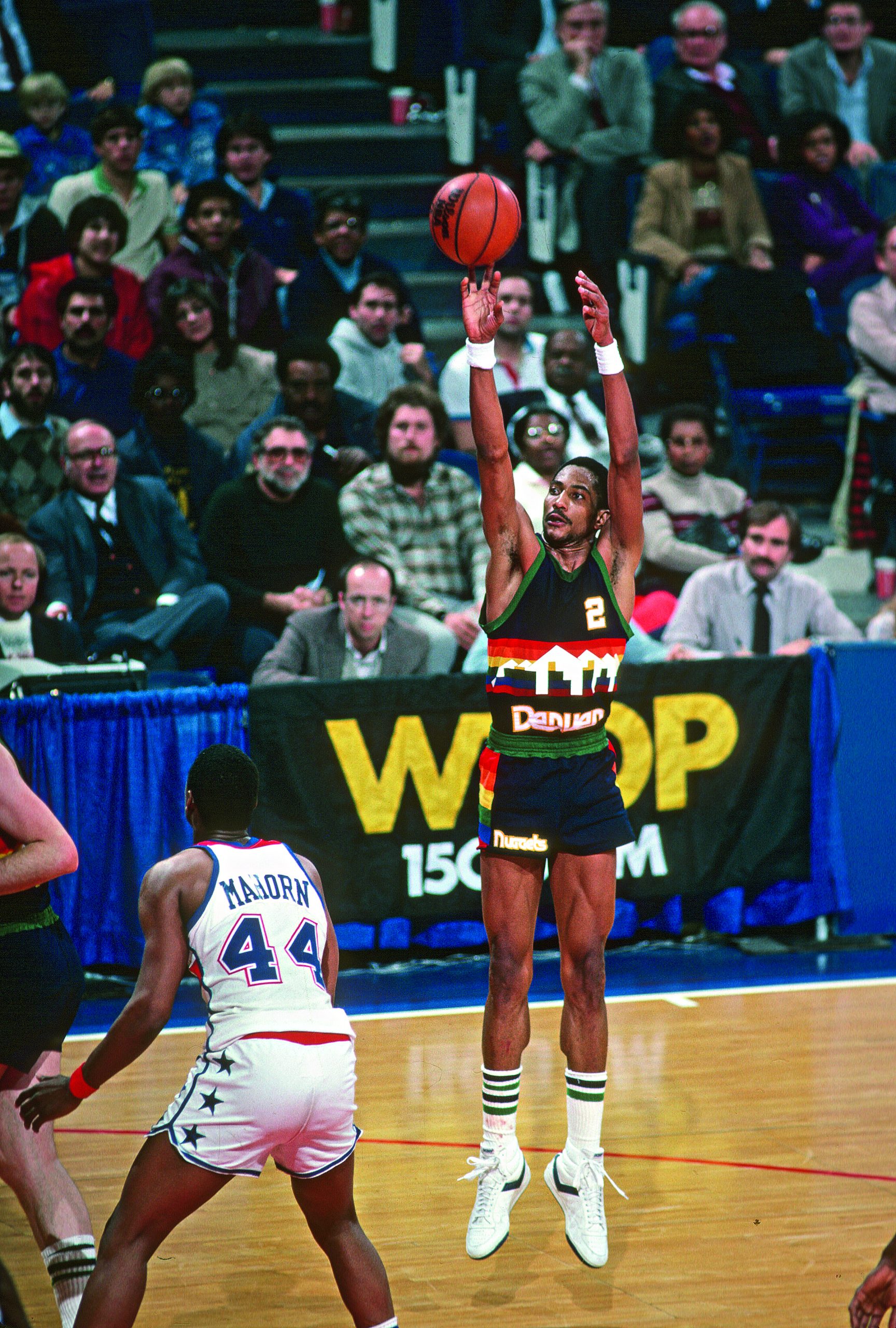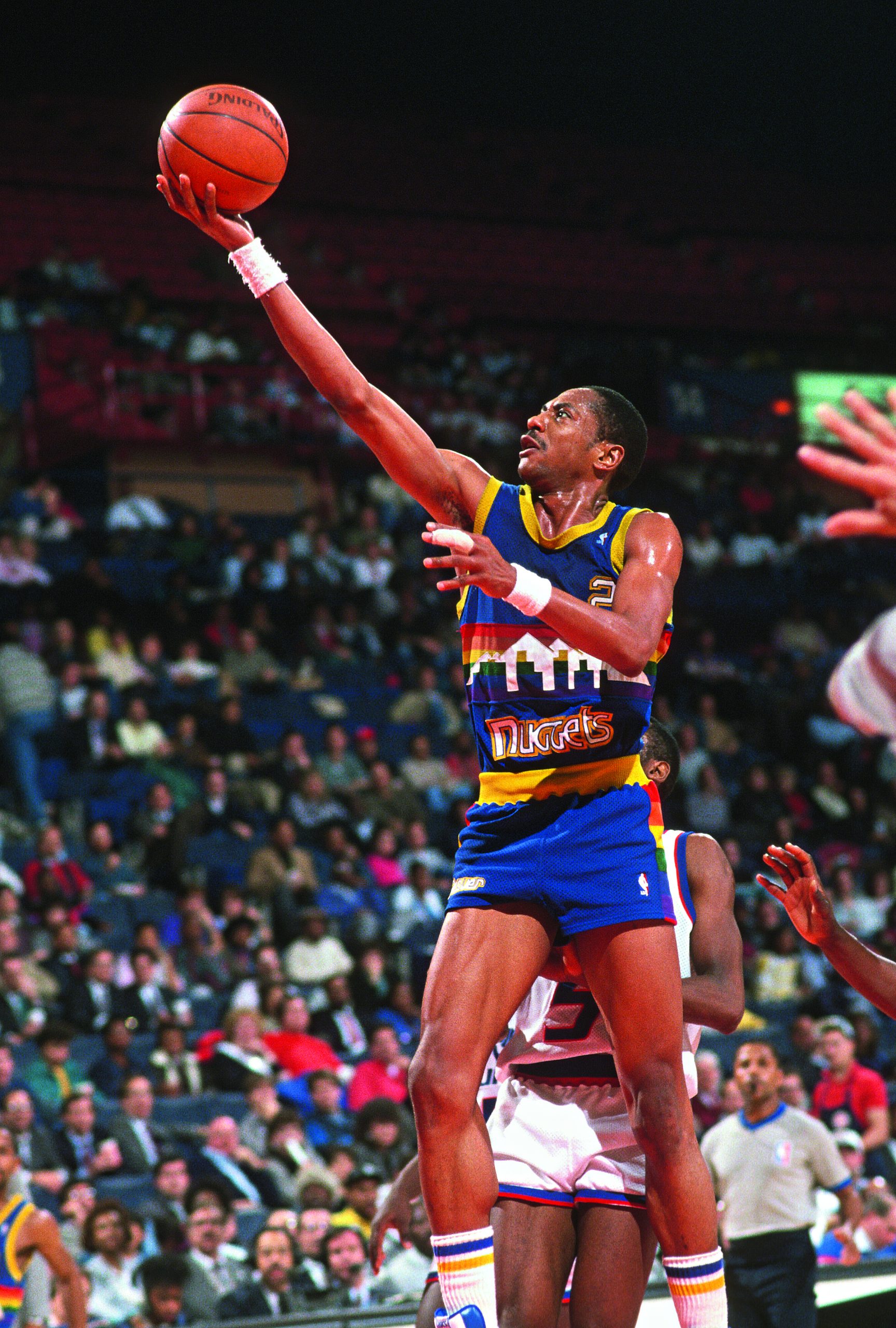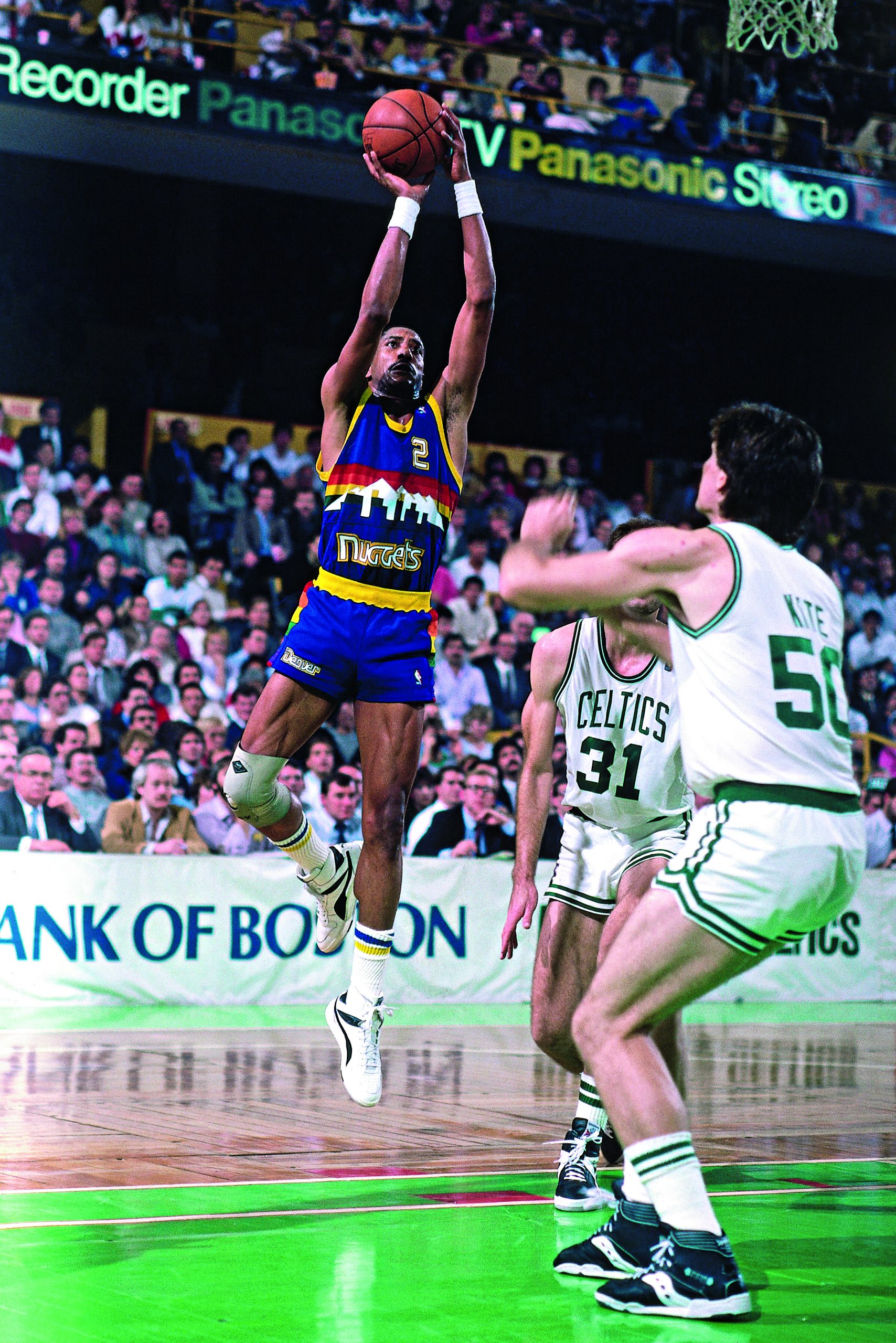Alex English Opens About His Prolific Career and Supporting Women’s Hoops in South Carolina
In the pre-League Pass days of minimal cable channels and a national TV “schedule” that made it seem as though the NBA had five teams (Boston, Chicago, Los Angeles, New York and Philadelphia) playing a round-robin, the exploits of Alex English and the Denver Nuggets could feel fictional. Newspapers said there was a guy named Alex English leading the NBA in scoring at about 28 ppg. And that he had a teammate, Kiki Vandeweghe, who was second. And their team’s games usually ended with a score like 137-129.
That’s how I learned about the Hall of Famer English, and even though I was a kid in the ’80s, he and the Nuggets were overlooked by adults back then, too. Just ask an NBA fan of any age this question: Who scored the most points in the 1980s? Even if they know Michael Jordan’s career started too late and that Magic Johnson was too pass-first, they have a host of household names to offer up. Moses Malone. Larry Bird. Dominique Wilkins. George Gervin. All-time leading scorer Kareem Abdul-Jabbar. The 6-7, 190-pound English outscored all of ’em. English used his elite mid-range game, willingness to run the floor and all-around efficiency to score 21,018 points in the decade (Moses was second at 19,082).

The above would be interesting to SLAM readers at any point in the magazine’s history and to be sure, Alan Paul did a piece on English for SLAM 21 back in 1997 that pointed this out. Sadly, the scope of the eight-time All-Star’s achievements and the lack of credit they’re given have renewed relevance in the wake of the NBA selecting a mostly glorious 75th Anniversary team that did not include English.
Besides being wowed by Nuggets box scores in the paper and enjoying the occasional game on TV against my local Knicks or Nets, my love for English was enhanced by the fact that my late grandfather recognized him on a plane once and asked for his autograph. I still treasure the little scrap of paper that says “Best Wishes Ben Alexander English.”
Speaking on the phone from his native Columbia, SC, the University of South Carolina legend and current member of the school’s Board of Trustees chuckles at my autograph memory (“We were certainly flying commercial back then!”) and proves to be a charming and engrossing subject.
SLAM: You played for the Bucks and Pacers before you went to Denver. What’s the short version of what happened at your first two stops? It looks like you were putting up numbers from the very beginning of your career. I would have thought Nellie [longtime Bucks’ coach Don Nelson-Ed.] would love you?
ALEX ENGLISH: I got drafted by the Bucks in the second round. Wayne Embry was the GM and Nellie was an assistant coach. I had a make-good contract, which meant I had to make the team to get the contract. I signed for $55,000 with a $10,000 bonus if I made the team. That was a lot of money back then! I made the team and had a decent rookie year. I mostly played behind Bob Dandridge. The next year they traded Dandridge to the Bullets but drafted Kent Benson, Marques Johnson and Ernie Grunfeld. [Johnson and Grunfeld] played my position. I was the sixth man [English averaged 9.6 ppg in just 18.9 mpg.—Ed]. Nellie was the head coach by then and we made the playoffs. The NBA standard contract was getting ready to change. I was a restricted free agent—I could go anywhere I wanted but my current team could match. At midnight on the first day of free agency, [Pacers’ coach and GM] Slick Leonard signed me to a three-year deal: $135,000, $155,000, $175,000. I signed that contract. The Bucks had the opportunity to match and I’d have to stay. Wayne says Don said it was too much for me. So they let me walk. I had a good year and a half in Indiana but then they had the chance to bring George McGinnis back home so Slick Leonard traded me to Denver for him.
SLAM: That trade was during your fourth season. In year five of your career, Doug Moe becomes the Nuggets’ head coach. In my mind, that’s when your career started.
AE: Well, I was putting up good numbers in Indiana, that’s why the Nuggets wanted to trade for me. I was [an] all-around [player]: rebounded, blocked shots, passed the ball. Averaging about 16 points a game, maybe 8 or 9 rebounds. But, yes, what happened in Denver was Doug Moe. He was the best at up-tempo offense.
SLAM: You guys were the highest-scoring team in the NBA in the ’80-81 season even though Donnie Walsh started the year as the head coach and Moe was an assistant. In Coach Moe’s first full season, ’81-82, the Nuggets averaged 126.5 ppg! Still the most in NBA history.
AE: It was Doug’s system. We played at a breakneck pace, and people couldn’t keep up with us. Once we got in shape, we were unstoppable. We had Dan Issel and we got Kiki Vandeweghe, too. They talked about us being a “high-powered offense.” It was just natural to us. That was what we did. One thing we knew was that other teams feared us. Teams knew they had to be ready to roll as soon as they got to the arena to play us.

SLAM: Was playing on those teams so much fun?
AE: Fun doesn’t even begin to describe it. I couldn’t wait to play every single night. It was almost like a dance. Like making ballet. That was my art. Every night was a different game, so we were making different art every night. I miss it so much.
SLAM: Do you have a favorite memory as a Nugget?
AE: Wow, there were so many wonderful moments. That was a good squad with good people. I miss that camaraderie. We did things as a team—parties, cookouts, all that stuff. That’s the thing I miss about being in that setting. And it showed on the floor. We all accepted our roles. If we didn’t do what was expected, we felt bad about it. My team relied on me to get 26 points a night, pass the ball, block a few shots, get 6 or 7 rebounds. TR Dunn knew we depended on him to lock up Clyde Drexler and Michael Jordan as best he could. Fat Lever knew we were expecting near a triple-double. Bill Hanzlik was gonna play defense and frustrate the other team. And Coach Moe was there the whole time. He gave us the tools and leeway we needed.
SLAM: You rarely missed a game and led the NBA in scoring for the ’80s. You were still left off the 50 Greatest list in ’96 but were elected to the Hall of Fame in ’97, which was the first year you were eligible. The NBA had a chance to make include you with the 75th Anniversary team this season, but you were left off again. How did that make you feel?
AE: I felt slighted. It’s been like that throughout my career. Look at the record in my Nuggets’ career. All those playoff appearances. Reached the Western Conference finals. I was an all-pro three years [English was second-team All-NBA in ’82, ’83 and ’86.-Ed]. The scoring. And then they don’t tend to look at the other things. I’m the all-time Nuggets leader in points and assists. I blocked shots. Got steals. To see how I was treated…I rarely watch NBA games anymore because I’m so disappointed to not be in that group. When I look at who they chose, not to slight anyone, but I know what I did. To be slighted like that, it soured my taste for the League.
SLAM: After an amazing decade in Denver and one season in Dallas, you retired from the NBA and spent a season playing for Napoli in the Italian league.
AE: I’m a world traveler and I always wanted to live in another country. Unfortunately, I played for a team in Naples that wasn’t what it could have been, but I still wouldn’t change that experience for the world. Eating the food, meeting the people there.
SLAM: You had a stint as President of the NBA Players Association while you played and after your season in Italy, you returned to the States and worked for the PA, right?
AE: Yes, I’d planned on working for the NBPA and I did that under Charles Grantham. A lot of stuff they have in place, I put there. The player programs, AIDS education, money management and degree completion, rookie transition program. Those are programs I put in place that are still there now. The high school camp the PA runs, we put that together. I wanted the PA to get a connection to the players before they get to the NBA. The guys who are still running it—Tim McCormick and Purvis Short—those were my guys. I’m proud of all that work.

SLAM: After you left the PA, you did some work with the NBA and then transitioned into coaching.
AE: Yes. I found out the NBA was going to do a developmental league and wanted to put a team in Charleston, SC. I petitioned for that job and got it. I moved to Charleston as the head coach of the Lowgators. We were the subject of the first sports reality show [Down Low, Life in the D League, from ESPN. Google it!-Ed]. It was revolutionary. My team lost in the championship. After that first year, the Hawks asked me to be an assistant coach. Then I coached with the Sixers and Toronto.
SLAM: Let’s talk about all your connections to the women’s game, from the WNBA to South Carolina to the fact that your daughter, Jade-Li, is now leading the women’s basketball division at Klutch Sports.
AE: I was in New York when Ange-Marie Hancock put the template for the WNBA together years ago. You look at how much it’s grown…last year’s WNBA Finals was so exciting.
Overall, the game is so pure. It’s like [how] it used to be with men. There’s the mid-range game, post-ups, an emphasis on getting position. The women look for three-point shots but it’s not the total game. Fortunately, for me, I’ve gotten to see some of the best right here at South Carolina. A’ja Wilson. Aliyah Boston. All the other women who have been here. We have the greatest women’s coach there is in Dawn Staley. I’m just a big supporter. We’ve got two top-10 high schoolers right here in this city and the fan support here is off the charts. That’s from watching Dawn. One of the girls [HS senior Ashlyn Watkins-Ed.] is signed with Dawn. The other is in the 11th grade—Milaysia Fulwiley—and I’m telling you, she is a game changer. Like the same way Magic changed the game. Hopefully she signs here, too.
Ben Osborne is a former SLAM Ed. and is now Head of Content for Just Women’s Sports.
Photos via Getty Images.